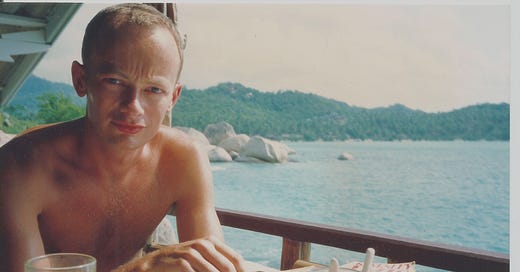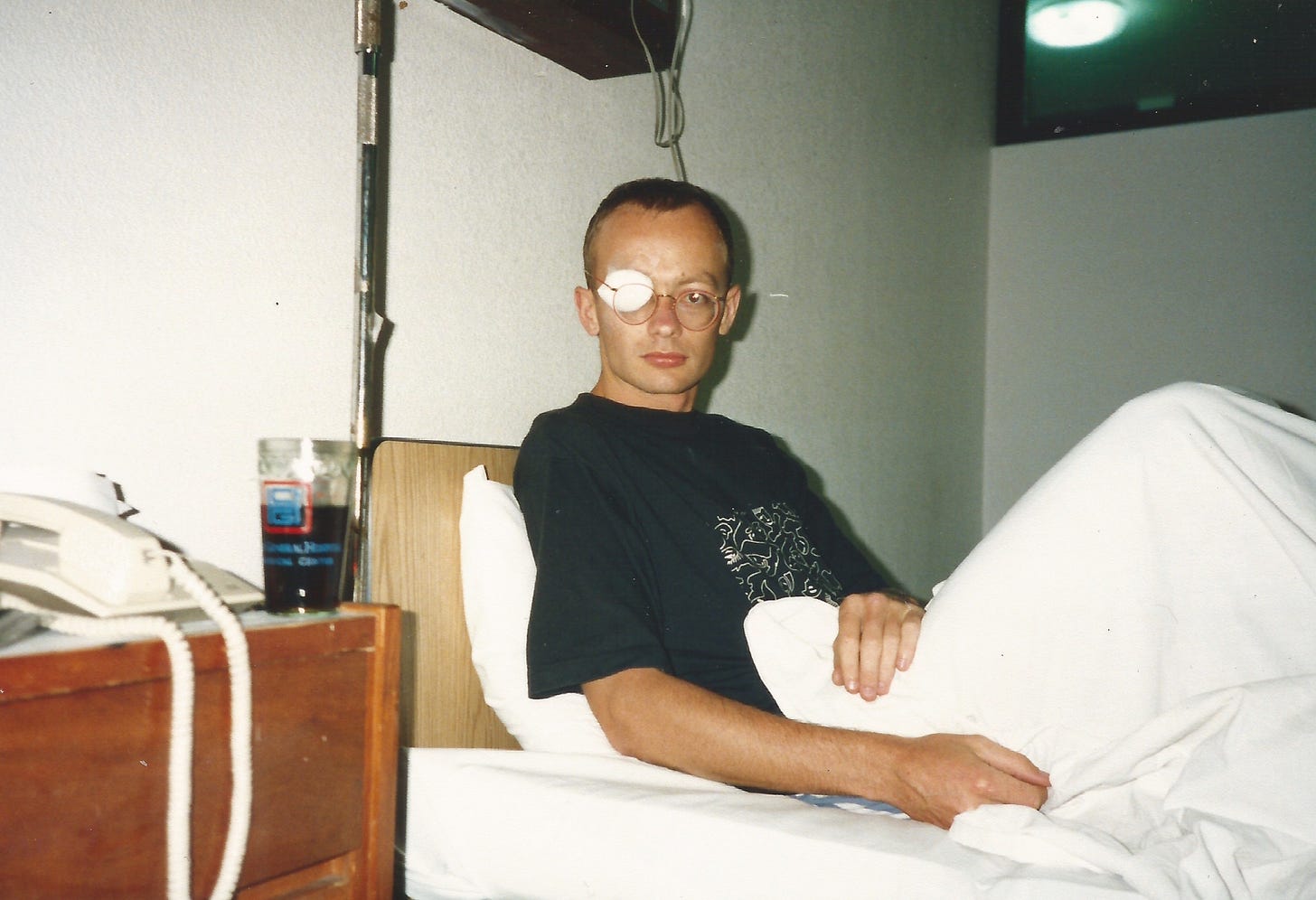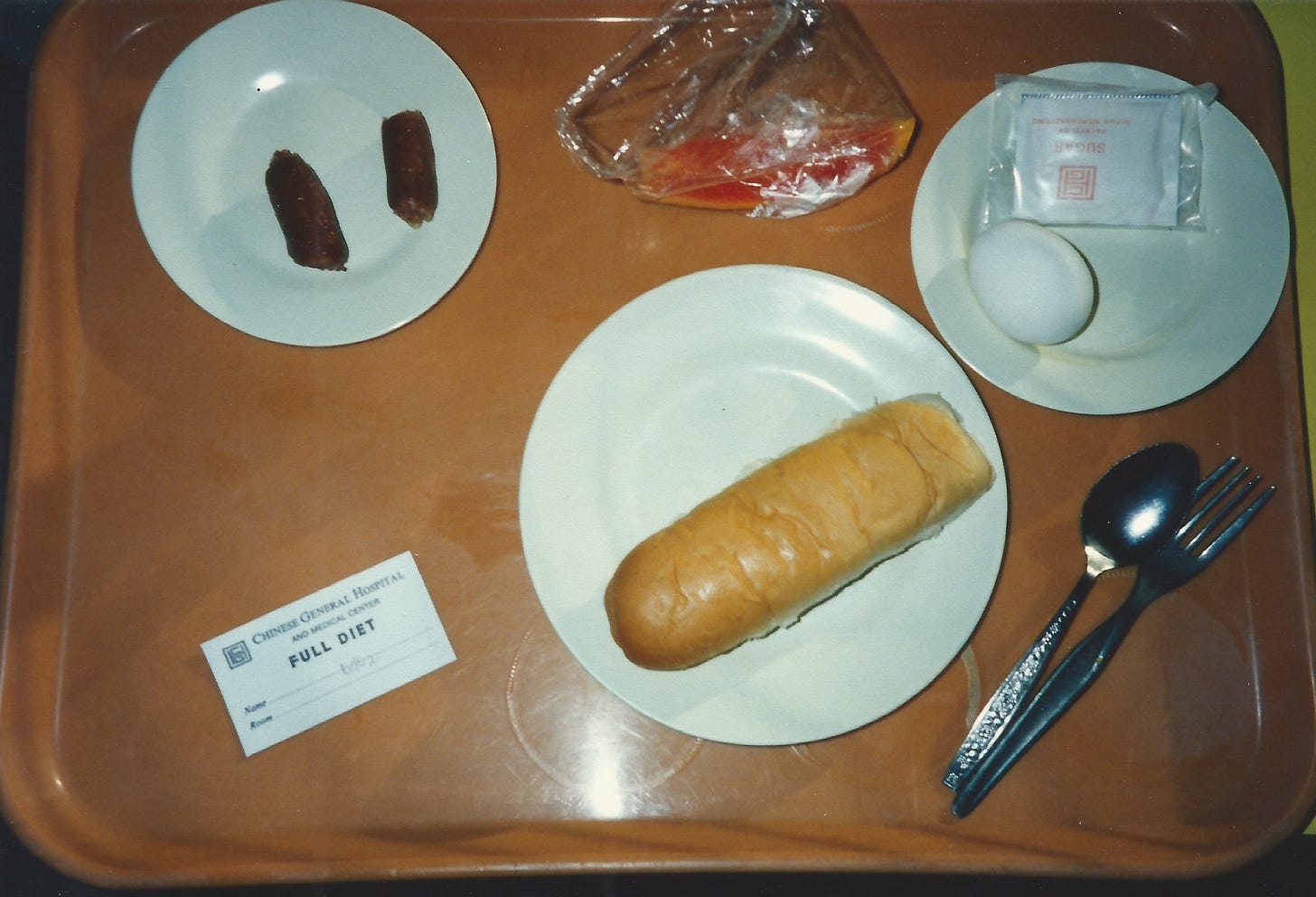The doctor shone a bright light into my right eye and uttered three words that would change my life: “Oh … my … God!” He snapped off the light. “You’ve detached your retina, quite badly. You’re going to need an operation.”
As this news sank in, I felt the blood drain from my head. One of the doctor’s assistants helped me to a couch where I lay down, a thousand thoughts racing through my mind.
I was in the Philippines, learning to dive on the island of Cebu, on what should have been a year-long backpacking trip. It was 1992 and I was 27 years old. I had been away from home for almost five months, working briefly on a newspaper in Hong Kong then travelling around Thailand and Vietnam.
It had been a spur-of-the-moment decision to take a side trip to the Philippines, a troubled country that had delighted, confounded and sometimes scared me. The people could not have been more warm and welcoming with their relentless cheerfulness and generosity, but it was hard to avoid encounters with poverty and the constant muted threat of violence.
As I lay staring at the ceiling of a hospital consulting room, I tried to focus on the eye specialist as he breezily explained my prognosis. While I waited for surgery, he told me, I should take precautions not to allow my retina to become completely detached, as this could result in permanent blindness. “Sex is totally out of the question I’m afraid,” he grinned and winked at me. “Can you live without sex for two weeks?”
I’m sorry. Did I hear that right?
I stared grimly back at his chubby smiling face, and he turned to his two young female assistants. “How about you two? Could you live without sex for two weeks?” They giggled demurely, apparently unsurprised by his inappropriate behaviour.
A more serious conversation followed, and he offered to carry out the operation himself. I thought: No way on God’s Earth is this goon going to cut my face apart with a scalpel.
“Er, could I maybe fly back to London for the surgery?”, I asked.
He thought about it for a moment, then agreed. “But don’t delay. And no bumpy road journeys.” Also, he added, I should sleep on my left side.
The bus ride back from Cebu City to my guest house in the tiny resort of Moalboal would have taken about two hours, over badly-made roads. It was out of the question. Most of my possessions were there, but I did have my passport, money and a camera with me, plus the clothes I was wearing: a T-shirt, shorts and trainers.
At a travel agent, I booked a flight to the capital Manila leaving that afternoon, and an onward ticket home. I phoned my parents then walked to the bus station where - luckily - I found a young Swedish traveller heading to Moalboal. I gave him a written note for my dive instructor and some money to pay for my room. I didn’t know if he would do as I’d asked, or just keep the money, but I had little choice.
I did a quick mental inventory of everything I would leave behind: camera equipment, my journal, clothes, toiletries, rucksack. Not much in the big scheme of things. I had time to eat lunch and visit a department store where I bought a shirt, underwear and a pair of long trousers.
I was in a state of shock: dazed but pumped with adrenaline, laser-focussed and strangely calm. More than anything, I knew I didn’t want to undergo eye surgery in a country where barely anything worked. In the past two weeks I had experienced multiple power cuts (known locally as “brown-outs”), two bus breakdowns and an earthquake that left thousands of people homeless. I yearned for the boring stability of a developed Western country.
The previous evening, I had been revelling in the freedom and autonomy of solo travel. I was drinking beer at a beachfront bar with a group of people I’d known just a few days, watching the sun set, eating seafood. I mentioned in passing that after dark I couldn't see too well in my right eye, like a shadow was falling across my vision. One of my fellow dive students, an Irish nurse, moved a finger across the front of my face to test my sight. “You should get that checked out,” she said.
“Yes, I will, maybe when I get back to Manila.”
“No, I mean soon. Tomorrow.”
That’s when I felt the first pang of fear. I left my room at the guest house for the bus stop the next morning and made the unusual decision to take all my money and my passport with me. If I was mentally preparing for the worst, I wasn’t consciously aware of it.
It was a short flight from Cebu City to Manila. My flight to London was in the morning so I took a taxi to a hostel where I’d stayed before. I ate dinner and settled down to sleep, on my left side.
Next day, when my taxi arrived at Manila airport, something looked wrong. Hundreds of people were milling about, outside the terminal building. I went inside and found a huge boisterous crowd of people and heard a public announcement: the air traffic controllers had gone on strike and no flights were expected to leave that day.
I joined a queue to use a pay phone and decided to call my travel insurance company. Medical emergencies were covered in my policy, and surely this qualified. Finally, I got through and - above the noise in the terminal - explained my predicament. The person I spoke to was calm and assertive. “We’ll sort it out. Write down this number and call me back in an hour.”
I called back, exactly an hour later. “We’ve arranged for you to have the operation at the Chinese General Hospital in Manila. It’s a private hospital. Take a taxi there now. They’re expecting you.”
Relief surged through me. Finally I no longer had to decide what to do next. I was somebody else’s responsibility.
I don’t remember too much about my stay in hospital. I was there for a week, in my own room, with nothing to read, no writing materials, not even a TV. It was by far the loneliest time of my life. The nurses were friendly, when they appeared, but the food was pitiful.
In the Philippines when someone is admitted to hospital, a close relative will usually stay with them, sleeping in an adjacent bed, delivering all their meals, chatting, keeping up their spirits. As a result, the food served by the hospital is rarely eaten, so money isn’t wasted on it.
I had a spare bed in my room, but nobody to sleep in it. “You have no companion?” one of the nurses asked, with a pained expression.
Meals arrived but they were unappetising. Breakfast might be a stale bread roll, a sausage and a piece of fruit. Dinner was exactly the same, probably the same food recycled. A nurse took pity on me and offered to buy me groceries before her next shift. I gave her money and she brought a bag full of Coca-Cola bottles, crisps and biscuits. Junk food has never made me happier.
The surgeon visited on the second day to explain the operation which, he said, would take about five hours. The chances of a successful outcome were very high.
Next morning I was lying on a trolley in a corridor, woozy with opiates, when the whole hospital was thrown into darkness. The whirring of machines stopped. Another brown-out. Fortunately, I was too drugged up to care, and an emergency generator soon kicked in. Then I was taken into a room to meet the anaesthetist.
There was no pain after the operation. I wore an eye patch and felt a little sick from the anaesthetic. The food looked less appealing than ever. I lay in bed for hours, maybe days, then sat up, then slowly paced the room. Nurses occasionally appeared, and the surgeon visited once to say the operation had been a success. I didn’t think to ask when I could leave. I had no energy. I felt as if I’d fallen to the bottom of a deep well, in a dark, cold and lonely place. I’d lost a lot of weight.
It was perhaps the only time in my life that I’d experienced the depths of depression, yet before I left the Philippines, one thing happened that filled me again with joy and hope. After arranging my discharge from hospital, the insurance company booked me a room at the Ambassador Hotel for one night before my flight to London. At check-in, I gave my name and the receptionist said “Ah, just a moment”, went into a back room and returned with … my rucksack.
I stared in disbelief. It was most definitely mine, but how had it got here? Clearly, the Swedish traveller had given my note to Geoff, the dive instructor, and paid my bill at the guest house. But how had they known I’d be here? Who’d shipped the bag, and who’d paid the bill? I’d told the divers in Moalboal I was going to Cebu City for a check-up, so presumably they had phoned the hospital. Had the sex-obsessed eye doctor tracked me down to Manila? Perhaps he wasn’t such a fool after all. I felt overcome with gratitude but, to this day, I still don’t know how this miracle was pulled off.
When I landed in London, my parents met me at the airport and I stayed at their house for a month or two, slowly recovering my confidence and enthusiasm for life, and putting some weight back on. I saw an eye specialist who said the surgeon in Manila had done a “pretty good job”. The silicone buckle, which held together the back of my retina, gave me bouts of double vision for a few weeks, but it settled in and it’s still there now, 30 years later.
The consultant in London examined my other eye and found some holes around the edge of the retina. To avoid that one becoming detached, I underwent a second operation to have a band fitted around the eye. We decided the damage to both eyes had probably been caused by a mountain bike accident three months before I left for Asia, which left me with concussion. It would have been exacerbated by long bumpy bus journeys in the Philippines.
The surgery didn’t dent my passion for travel and the following winter I found myself staying on the Pacific coast of Costa Rica on another five-month backpacking trip. I wrote a postcard to the surgeon in London, describing all the things I could see as I sat on the beach, and thanking him. I couldn’t thank the surgeon in Manila - I didn’t find out his name.
I wish those feelings of awe and gratitude - the knowledge that if I’d been born a few decades earlier I should have been blind by now - had lodged themselves within me. But like all emotions - terror, joy and every point in between - they fade in time.








Thank you for reading my story. This was a life-changing episode for me, but the first time I've written about it in 30 years. I found it challenging but ultimately cathartic.
Great read and relief too, Mark!